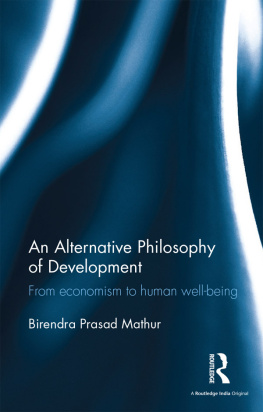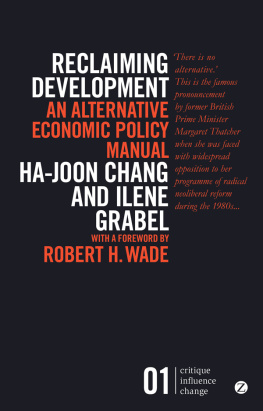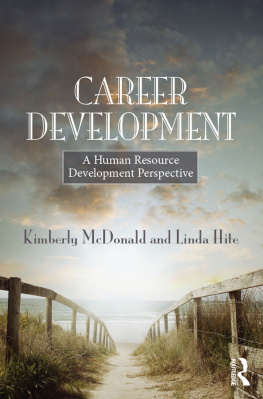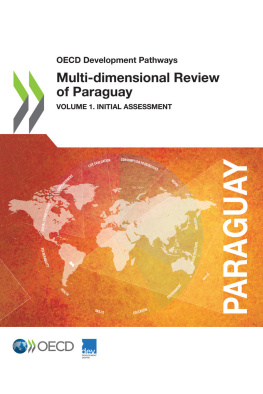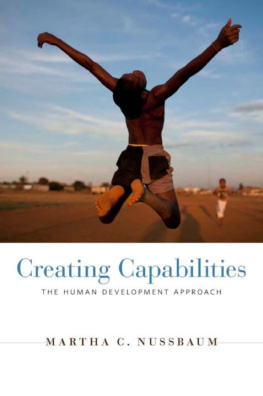An Alternative Philosophy of Development
While development has been the foremost agenda before successive governments in India, it has been viewed narrowly from the perspective of economic development and particularly in terms of gross domestic product (GDP). This book questions such an approach. It breaks from the conventional wisdom of GDP growth as being a definitive measure of the success of a countrys policies and offers an alternative development philosophy.
The author contends that peoples economic and social welfare, life satisfaction, self-fulfilment and happiness should be treated as indicators of real development. The book underlines that in a successful model of development, the countrys economic policies will have to synergize with its cultural ethos and that the objective of development should be gross national happiness and well-being of the people.
This book will be useful to scholars and researchers of development studies, economics, public policy and administration, governance, political science and sociology, as well as to policymakers.
Birendra Prasad Mathur is a former civil servant and member of the Indian Audit and Accounts Service with extensive experience of working with the government. He has served as Deputy Comptroller and Auditor General and Additional Secretary, Government of India; and Director, National Institute of Financial Management, India. He holds a PhD and DLitt in Economics from the University of Allahabad, India, and has been a visiting faculty member at Panjab University, Chandigarh; Bajaj Institute of Management, Mumbai; Indian Institute of Public Administration, New Delhi, and many other national-level institutes. He is presently engaged as a spiritual seeker, author and social activist with spiritual interests. He is Vice-President, Common Cause. He has authored several books on governance, finance and economics, besides two novels in Hindi, and is the recipient of the Paul Appleby Award for services rendered for public administration.
The author brings the light of vast experience and deep reflection in critiquing the prevailing economic narrative based on the neo-liberal free market capitalist model that has failed in solving human problems of poverty, injustice and inequality. He offers an alternate model of wholesome development that ensures sustainable progress, universal justice and peaceful coexistence. In this effort he pits the Gandhian economics premised on freedom from greed, possession and violence against the Adam Smith and Darwin-inspired economics of private property, mindless competition and free trade, and convincingly shows the superiority of the Gandhian model in ensuring gross human happiness. A seminal work in understanding contemporary economic and social woes and finding alternate ways of effective problem solving.
Swami Bodhananda, Vedanta exponent and chairman, Sambodh Foundation India and Sambodh Society, USA
This book gets back to the foundations of Indias religion based on the concept of universal humanism (vishwa kutumb) rather than viewing religion as a political instrument. It is both provocative and practical, and blends Indias culture with the international literature on happiness. It is also very readable in its practical discussion of Indias economy.
Y. K. Alagh, Chancellor, Central University of Gujarat and Former Minister for Power, Planning and Science and Technology, Government of India
An Alternative Philosophy of Development
From economism to human well-being
Birendra Prasad Mathur
First published 2017
by Routledge
2 Park Square, Milton Park, Abingdon, Oxon OX14 4RN
and by Routledge
711 Third Avenue, New York, NY 10017
Routledge is an imprint of the Taylor & Francis Group, an informa business
2017 Birendra Prasad Mathur
The right of Birendra Prasad Mathur to be identified as author of this work has been asserted by him in accordance with sections 77 and 78 of the Copyright, Designs and Patents Act 1988.
All rights reserved. No part of this book may be reprinted or reproduced or utilised in any form or by any electronic, mechanical, or other means, now known or hereafter invented, including photocopying and recording, or in any information storage or retrieval system, without permission in writing from the publishers.
Trademark notice: Product or corporate names may be trademarks or registered trademarks, and are used only for identification and explanation without intent to infringe.
British Library Cataloguing in Publication Data
A catalogue record for this book is available from the British Library
Library of Congress Cataloging in Publication Data
A catalog record for this book has been requested
ISBN: 978-1-138-69312-8 (hbk)
ISBN: 978-1-315-38874-8 (ebk)
Typeset in Sabon
by Apex CoVantage, LLC
Contents
Part I
The current socio-economic setting
Part II
The current economic ideology and its problems
Part III
Rethinking development
Part IV
Culture as foundation of development
This book is the outcome of my realization about the depth and charm of our ancient culture and civilization and the relevance of the wisdom contained therein, for our social and economic policymaking. Indias ancient wisdom as expressed in the Bhagavad Gita, Upanishad and other scriptures gives meaning and purpose to human beings existence on this planet earth and how to lead a happy and fulfilling life. It was this philosophy which inspired Swami Vivekananda, Rabindranath Tagore, Mahatma Gandhi and countless other noble men and women to usher in an Indian renaissance, with a view to not only give it political freedom but also liberate its suppressed soul. Indian philosophy has inspired some of the best minds in the West in the past two to three centuries, and today it exercises a defining influence in America, the land of riches, with a large section of the population practising yoga and meditation and moving away from a materialistic orientation of life.
Today as I look around, seven decades after independence, India is not a very hospitable place to live in. There is growing intolerance and violence in society. Our educational system is in disarray, and medical services are non-existent, except for the rich. The cities are crumbling, streets choked, slums mushrooming and garbage piled all over. A new class of super-rich has come up, leading a life of opulence and luxury with poverty all around. It is all a case of private affluence and public squalor. Much of our problems is due to the model of development we have adopted, which considers material progress or economic growth as the sole measure of peoples welfare. We are blindly imitating the current ruling economic ideology of the West, without understanding the strength of those societies. The success of Western countries is largely due to their value system. Protestant ethics, which shaped these societies in the past two centuries, emphasized honesty, hard work, discipline and thrift. The Enlightenment movement brought the age of reason, scientific spirit, rule of law and democracy.
Successful development can take place only when it is built on the foundation of a countrys cultural values. Indian culture is ethico-spiritual and believes in simple living and high thinking. According to Indian thought, the spirit pervades the whole universe, and the material world is merely a manifestation of that spirit. Human beings have not only physical and biological dimensions but also psychological and spiritual dimensions. It is the spiritual dimension of human beings that gives rise to noble values such as truth, honesty, love, sharing, community spirit and service. On the other hand, materialistic values give rise to baser motives such as selfishness, corruption and greed.

